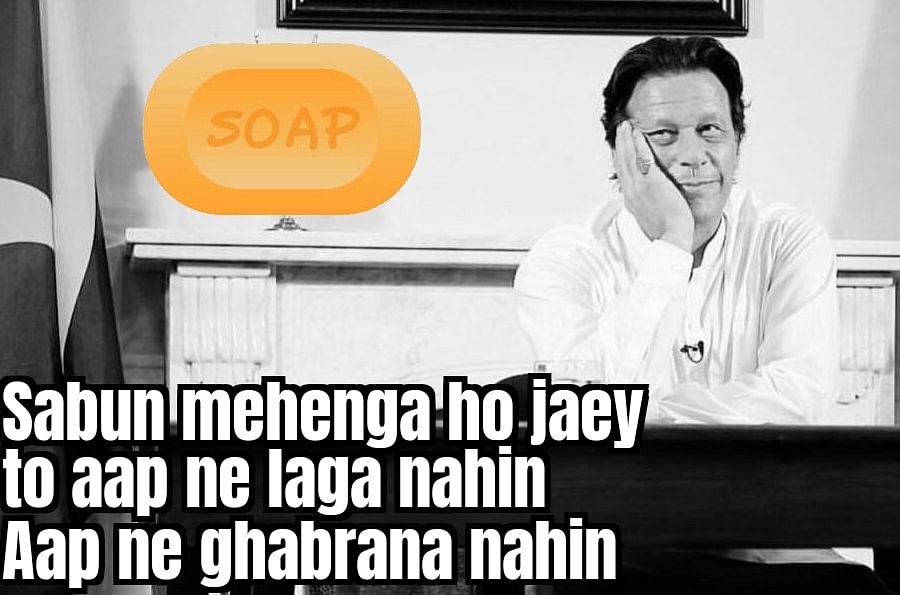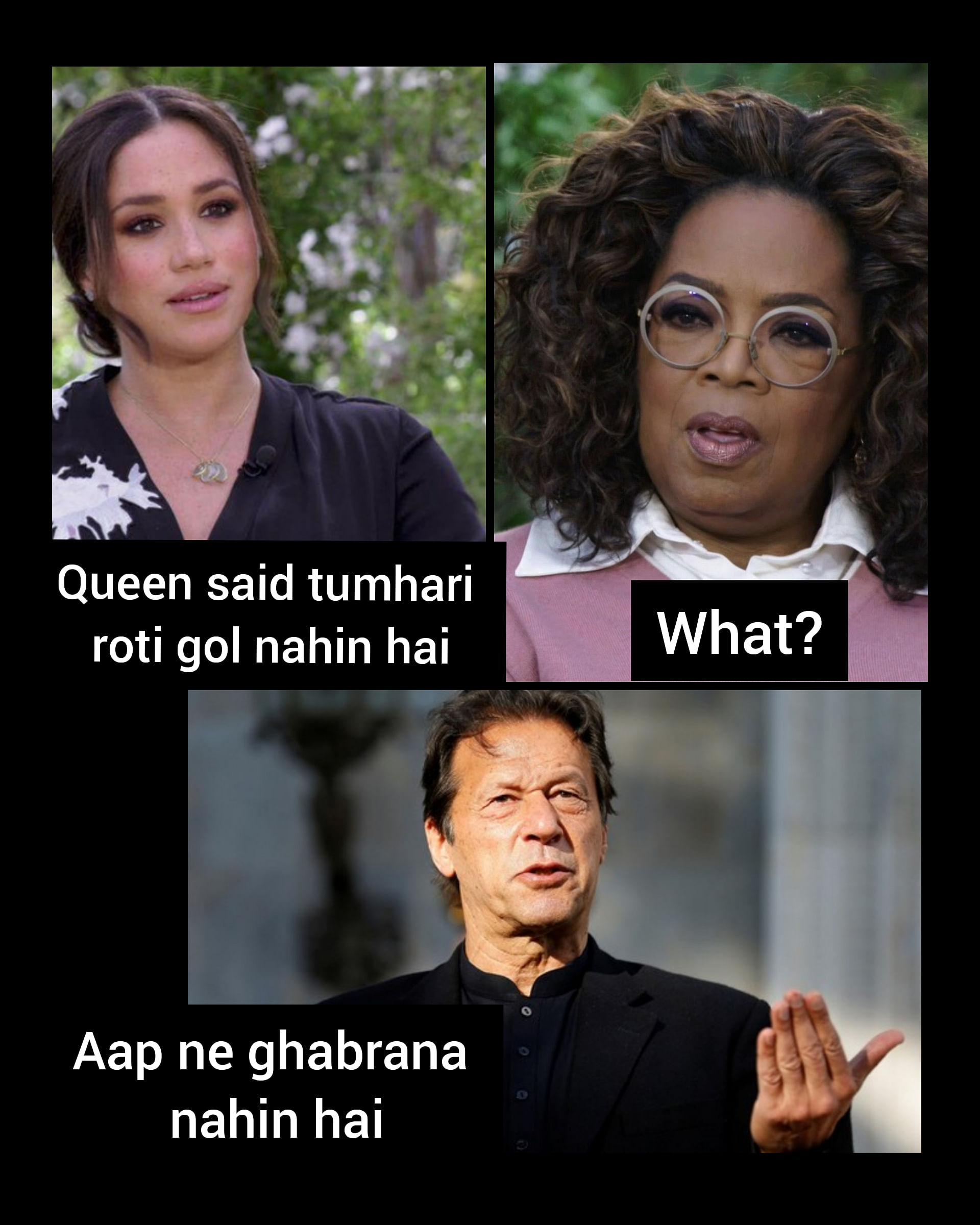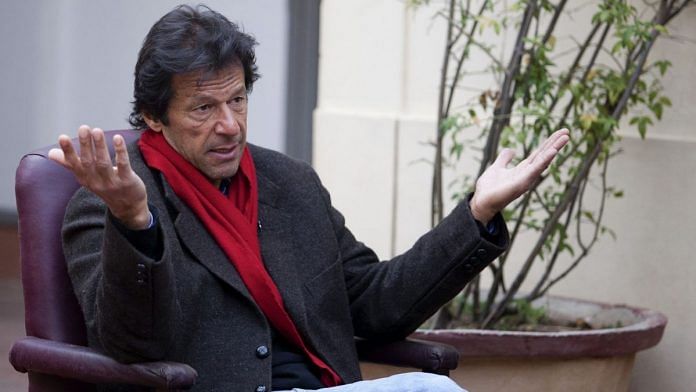Hum dekhenge? No thanks, we have seen enough. Humein ghabrana nahin hai is the new dope in Pakistan. To see is not a worry, to panic is not an option. If you still don’t understand what it means, then you are cancelled.
With food inflation rising, cost of chicken touching Rs 500 per kg, petrol price shooting up and the electricity bill giving a shock, there’s a new anthem in Pakistan — ‘ghabrana nahin hai’. Or as Bollywood’s Aamir Khan said: ‘all is well’. But Pakistan’s new anthem doesn’t quite promise the ‘well’ part. The journey of aap ne ghabrana nahin hai — you must not worry — began in August 2018, when Prime Minister Imran Khan came to power. Today, it is like our new-year resolution that goes nowhere.

Thousands of miles and several broken promises later, ghabrana nahin hai is a nagging solace for Pakistanis. You may think the good ol’ sab theek hoga or all is well is an equivalent of ghabrana nahin hai but it isn’t. Because the latter’s charm lies in the fact that there are no promises things will get better or anything. It gives you nothing and takes away everything — actually, that’s also the Imran Khan government’s journey in a nutshell.
Also read: Imran Khan is in sorrow, wants vote of confidence. Opposition hopes it can finally oust him
Artist ghabraya nahi, gave a musical twist
Pakistani musician Saad Alavi’s satirical cover of PM Khan’s slogan would resonate with anyone who splurges on a bath soap, eats more than one roti, or thinks they can spend on medicine and also pay their children’s school fees. Wake up y’all, collect all that money and only pay your taxes. Or better yet, let quom remain in deep slumber, they don’t need to know what happens in the real world. Beda gark ho jaye, aap ne pachhtana nahin — the raft may sink but you shouldn’t regret. Aap ne ghabrana nahin is PM Imran Khan’s vain message for the Pakistanis. But the magic of Alavi transcends it beyond borders. Many Indians might think he was singing for them too in these times of inflation.
In an environment with excessive censorship on mainstream Pakistani media, it is difficult to make a joke about the government on national airwaves. And this regime definitely doesn’t have a sense of humour. In January, the media regulatory body issued a show cause notice to a television channel after a member of the National Assembly said on the news talk show: “When an addict comes to the house, he starts selling all the things.” He didn’t take any names, yet PEMRA swooped in and made it really easy for everyone speculating on who the comment was meant for or the intended but hidden mischievousness of the remark.
Last year, the government was riled up against famous comics Khalid Butt (Murtaza Chaudhry) and Mustafa Chaudhry after they depicted PM Imran Khan taking the hoor injection in a TV show. The PTI lawmaker approached the cybercrime cell of the Federal Investigation Agency to register a case against the comics because they showed PM Khan ‘as an addict injecting drugs in his body’.
That leaves only social media platforms. But even there, political satire comes with a huge risk of being attacked by the pack of vile government supporters online. And what happens ‘offline’ stays offline. Keep calm and ghabrana nahin hai.

Also read: An Instagrammer did what two govts couldn’t. Indians and Pakistanis came to pawri together
Pakistan’s tryst with political satire
Songs have been the most popular medium for political satire in Pakistan. From dictatorships to hybrid democratic times, Pakistani pop singers, like the writers, poets and journalists have used satire to communicate with their audiences.
Ali Azmat’s Bum Bum Phata from 2011 when Pakistan was riddled with years of war and terror, spoke about how the country’s leaders were playing their parts in a political circus while people remained devoid of basic amenities like water, food and electricity.
Similarly, Shehzad Roy’s Laga Reh, a scathing criticism of lawyers and politicians and how the “aam adami” was held hostage to their desires. The proverbial truck ki batti that the masses are forced to follow. However, there wasn’t any criticism of then military ruler General Pervez Musharraf’s era, who was central to the movement that lawyers built to oust him.
The idea of the past generation of pop singers was to put masses and members of the intelligentsia at the centre of their satire and not question the real rulers of Pakistan. One of the first times it happened was in 2011, with Beygairat Brigade’s Aloo Anday, a satirical masterpiece that ripped into the societal hypocrisies, the mullahs, the bigotry of the State and the holy cows that no one would take on. ‘Where Qadri, the killer of Punjab Governor Salmaan Taseer is royalty, Ajmal Kasab, the terrorist of 2008 Mumbai attacks is a hero, mullah uses burqa to escape and where no one acknowledges Nobel Laureate Dr Abdus Salaam because of his Ahmadi faith.’ Even a decade later, these words resonate, for nothing changes here. In 2013, the band came out with Paisay ki game, which was about the hegemony of Pakistan’s ruling elite.
In Dhinak Dhinak, the role of the military in running the country is talked about, how they will win against you every time, come what may — Gernaila’n da ae jaadu sab kar le ga qaabu. More close to our reality today, it speaks about the bribed TV analysts, the deep state, and the more real fear of going missing after talking about these subjects. Beygairat Brigade’s musician Ali Aftab Saeed has also ventured solo with a satire song ‘Pen di siri’ on Tehreek-e-Labbaik’s firebrand cleric Khadim Hussain Rizvi. Interestingly, late Rizvi inspired several Pakistani musicians, even if that wasn’t his intention.
For now, the government’s Senate election saga continues and any talk about our plan for the coronavirus vaccine is futile. Even if there is an uptick of Covid-19 cases in Pakistan, the focus should remain on buying vote than buying vaccine. When we will look back at the times of Naya Pakistan, we’ll recall how, when Rome was burning, we were at least singing ghabrana nahin hai.
The author is a freelance journalist from Pakistan. Her Twitter handle is @nailainayat. Views are personal.




It’s an absolute treat to read Naila’s tongue in cheek articles.
I don’t think we have an Indian equivalent who writes with such flair.